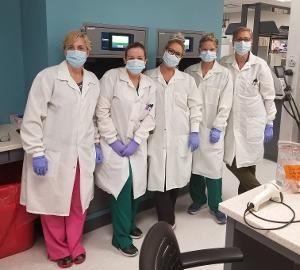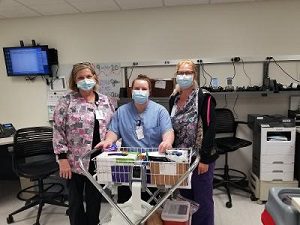Beth Warning, MS, MLS(ASCP)CM, AHI, ASCLS Region IV Director
Meighan Sharp, MLS(ASCP)CM, ASCLS-Michigan Government Affairs Committee Co-chair
Most often we hear about resistance to change, where people fear it, run from it, and drag their heels to avoid it. We fear the loss of control over what we know and are comfortable with. We fear the unknown and what change will bring. We think change may bring more work, or make us feel stupid, or make us appear inept. For many of us, if it ain’t broke, we ain’t gonna change things.
But now, there are new terms for change, words that are part of our everyday vocabulary indicating what the global pandemic has brought—adapted, converted, pivoted, shifted, modified—all because of the “unprecedented disruption” and “sudden interruption.” Never before has there been such a time of urgent, critical change for members of the medical laboratory community where we have rapidly changed and then changed again. And as the winds of change swirl around us, we choose to show our “grit.”
“Having a passion and sustained persistence—what better words to describe the laboratory professional in the whirlwind we call the novel coronavirus pandemic!”
Angela Duckworth, a professor of psychology at the University of Pennsylvania and expert on grit, defines it as a person having a passion and sustained persistence. Having a passion and sustained persistence—what better words to describe the laboratory professional in the whirlwind we call the novel coronavirus pandemic! While Duckworth has spent years studying situational effects to bring about this resiliency, grit has been demonstrated daily on the frontlines of the laboratory as we face a global pandemic head on.
From those in institutions of higher education, we had literally days to devise a plan to deliver lectures in an online synchronous or asynchronous fashion, along with making provisions for virtual online lab sessions during the spring term (which has now carried through into the teaching strategies for summer and fall and …). Clinical rotations were delayed, shortened, or even omitted, as clinical placements were no longer an option with our usual affiliates. The strong online cohort of educators rallied via social media and through online communities to share ideas and best practices, knowing that we are all in this together. We sacrificed our stockpiles of PPE to those on the frontline, as there was no longer a need for gloves and masks when providing YouTube videos and paper problems in place of face-to-face lab sessions.
Laboratory directors suddenly became supply chain managers, scavenging for PPE to protect their “work families,” now frontline staff. Pandemic plans were written and rewritten. Scheduling was complicated, creating “bubbles” and “work groups,” shifting those on normally high-volume benches to become COVID processors, accessioning samples, or collection kit assemblers, having the right people at the right time.
Many of us are still moving headfirst into the wind, putting one foot in front of the other. Some days we stride two steps forward; other days we lose ground and take two steps backward. If there is one thing to take note of, it is that we, as a profession, have stepped up to the challenge, because we are resilient.
To highlight just how gritty we are here in Region IV, Meighan Sharp, of ASCLS-Michigan, shares the passion and persistence of McLaren Port Huron. We are all in this together. Resilience, grit, passion, persistence: laboratory professional.
Beth Warning is Assistant Professor in the Medical Laboratory Science Program at the University of Cincinnati-College of Allied Health Sciences.
 |
| From left: Cindy Sliwinski, MT(ASCP); Meighan Sharp, MLS(ASCP)CM; Chelsea Khabbaz, MLS(ASCP)CM; Kara Kaufman, MLS(ASCP)CM; and Debbie Isenhart, MT(ASCP), at McLaren Port Huron. |
 |
| From left: Shirley Schemanske, Jillian Frank, and Tracy Gracey, phlebotomists at McLaren Port Huron. |
Meighan’s Story
I work as a generalist at McLaren Port Huron (MPH) in Port Huron, Michigan. MPH is part of the McLaren Health System with nearly 20 hospitals and clinics across the state of Michigan. McLaren recently branched out into Ohio with the acquisition of St. Luke’s Hospital in Maumee.
In the first few months of the pandemic our hospital was hurting. Gretchen Whitmer, governor of Michigan, banned elective hospital services and surgeries throughout the state to help conserve stores of PPE. Our outpatient laboratory closed from March to June. Our affiliate clinics and doctors’ offices closed their doors moving toward telehealth appointments. Phlebotomists, lab support staff, and some IT staff were furloughed due to the dramatic decrease in patient specimen processing. Techs were asked to take “low census” days off to keep staffing at a minimum. Our blood bank was hurting as well. Blood supplies were at a critically low volume. Our blood supplier, American Red Cross Southeast Michigan Region, was not getting its supply due to local blood drives being canceled. Their distribution center had to close its doors altogether for a while due to a spike in COVID-19 cases among their employees. We had to rely on getting blood from Lansing, which was double the drive time for couriers.
McLaren was no stranger to stepping up when it came to COVID testing. McLaren uses a centralized laboratory model. All McLaren affiliate hospitals send a certain percentage of their laboratory work to McLaren Medical Laboratories in Flint. That included our COVID testing. Port Huron had the capability of bringing the rapid Abbott Alere COVID test on board. We were able to use this platform for patients needing emergency surgery and for inpatients needing to be discharged to long-term care facilities. All other COVID tests were sent to our Flint Lab where multiple platforms (Roche and Cepheid) were validated to handle the influx of specimens. Our turnaround times have improved from 48 hours in March and April to 12-24 hours today.
Today, we are busier than ever. Employees have been called back to work, surgeries are being performed, elective procedures are being scheduled and performed, and our outpatient lab is open once again to service our community. Our outpatient lab performs drive through swab collection for COVID testing (must have physician’s order). Our supply of PPE is good, too. McLaren has partnered with companies across the state to ensure we have an ample supply of gowns, gloves, masks, and shields. We are still running into other supply chain issues, however, as the Flint Laboratory still has Roche sample tips on backorder and Port Huron Lab has backorders on supplies like specimen caps, sample tips used for routine testing, and test tubes. MPH is currently completely out of Alere supplies for COVID testing with no date as to when an order will be fulfilled.
As ASCLS-Michigan’s co-chair for the Government Affairs Committee, I have been in contact periodically with our members of Congress and the Senate. They are always interested in hearing our stories and concerns. I have also begun reaching out to candidates running for seats in Congress to get their take and to educate them on the laboratory profession’s impact on the pandemic. I recently reached out to the Michigan House Appropriations Committee to express my disappointment on the distribution of CARES Act (Coronavirus Aid, Relief, and Economic Security) money for hazard pay use.
When I heard that CARES Act money was to be distributed to frontline healthcare workers as hazard pay, I was hopeful, but skeptical. I was right to be skeptical. After seeing the language of the bill that went to the governor’s desk, I saw that hazard pay was only being given to nurses, nursing aides, and respiratory therapists. I wrote a letter to members of the Appropriations Committee expressing my disappointment about this decision. I emphasized the role laboratory professionals have played during this pandemic and our importance to the health and safety to all Michiganders. I was able to get a response from Appropriations Committee Chair Shane Hernandez. He expressed his gratitude to all of us and the role we have played in this pandemic. He thanked me on educating him on the role that laboratory professionals play in healthcare. He also said there was only so much money to work with and they had to be extremely selective as to who would get hazard pay.
I continue to reach out to government officials both at the state and national level. I continue to go into work every day and give 110 percent to patients and coworkers. We have come back stronger and busier than ever. I have a great group of coworkers. We all have a great work ethic and rely on each other to release quality lab results every day.
Meighan Sharp is a generalist at McLaren Port Huron in Port Huron, Michigan.
